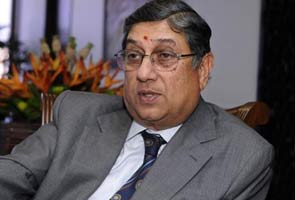
Hyderabad: The President of the Board of Control for Cricket in India (BCCI), N Srinivasan, was questioned by the Central Bureau of Investigation (CBI) in Hyderabad today in connection with the disproportionate assets case against YSR Congress chief Jagan Mohan Reddy. Mr Srinivasan was questioned by the CBI earlier on June 18 in the same case.
Mr Srinivasan had been summoned by the CBI on June 8 because he is the Managing Director of India Cements Ltd, which invested in Bharathi Cements and Jagathi Publications, companies promoted by Jagan Reddy. The CBI has alleged that India Cements invested in these companies in a quid pro quo - that two plants of the company in Andhra Pradesh received huge water allocations when Jagan Reddy's father YS Rajasekhara Reddy was Chief Minister of that state. This, the CBI alleges, helped India Cement increase production substantially.
Mr YS Rajasekhara Reddy, or YSR as he was universally called, died in a helicopter crash in 2009. Soon after his father's death, Jagan Reddy split with the Congress and formed his own party, the YSR Congress. The CBI alleges that while YSR was in office, he conspired with other ministers to influence entrepreneurs to invest in his son's companies; in return, the CBI alleges, they were granted licences and other permissions required for their businesses.
As part of its investigation in the case, the CBI questioned Andhra Pradesh Information Technology Minister Ponnala Lakshmaiah for over eight hours last week. Mr Lakshmaiah was the irrigation minister in the YSR Cabinet and he was reportedly questioned about the extra water that India Cements received.
The CBI inquiry into Mr Reddy's business empire and the source of its funds was ordered by the Andhra Pradesh High Court in August 2011. On May 27 this year, Jagan Reddy was arrested by the CBI and lodged in Chanchalguda jail, where he is under judicial custody till June 25. His party swept the Assembly by-polls held on June 15 on 18 seats.
So far, the CBI has arrested Jagan, his financial advisor V Vijay Sai Reddy (currently out on bail), former AP Minister Mopidevi Venkatramana Rao, industrialist Nimmagadda Prasad and senior bureaucrat K V Brahmananda Reddy. Apart from Mr Lakshmaiah, the agency has questioned two other AP ministers -- Sabitha Indra Reddy and Dharmana Prasada Rao -- over the government orders that allegedly benefited some companies.
Mr Srinivasan had been summoned by the CBI on June 8 because he is the Managing Director of India Cements Ltd, which invested in Bharathi Cements and Jagathi Publications, companies promoted by Jagan Reddy. The CBI has alleged that India Cements invested in these companies in a quid pro quo - that two plants of the company in Andhra Pradesh received huge water allocations when Jagan Reddy's father YS Rajasekhara Reddy was Chief Minister of that state. This, the CBI alleges, helped India Cement increase production substantially.
Mr YS Rajasekhara Reddy, or YSR as he was universally called, died in a helicopter crash in 2009. Soon after his father's death, Jagan Reddy split with the Congress and formed his own party, the YSR Congress. The CBI alleges that while YSR was in office, he conspired with other ministers to influence entrepreneurs to invest in his son's companies; in return, the CBI alleges, they were granted licences and other permissions required for their businesses.
The CBI inquiry into Mr Reddy's business empire and the source of its funds was ordered by the Andhra Pradesh High Court in August 2011. On May 27 this year, Jagan Reddy was arrested by the CBI and lodged in Chanchalguda jail, where he is under judicial custody till June 25. His party swept the Assembly by-polls held on June 15 on 18 seats.
So far, the CBI has arrested Jagan, his financial advisor V Vijay Sai Reddy (currently out on bail), former AP Minister Mopidevi Venkatramana Rao, industrialist Nimmagadda Prasad and senior bureaucrat K V Brahmananda Reddy. Apart from Mr Lakshmaiah, the agency has questioned two other AP ministers -- Sabitha Indra Reddy and Dharmana Prasada Rao -- over the government orders that allegedly benefited some companies.
No comments:
Post a Comment